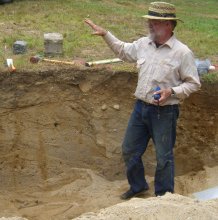
Prof. Bruce Bradley is one of three Humanities staff to be showcasing his research
Students vote Humanities staff as inspirational researchers and teachers
A special series of open lectures are to commence which invite students from other degree paths to experience the most inspirational research and teaching on offer at The University of Exeter, as voted for by students.
The event, titled ‘Fruni’ (Free Range University) is an initiative spanning UK Universities, and will be a new project led at The University of Exeter by the University’s Students’ Guild. The project is anticipated not only to provide insight into other degree paths, but to encourage undergraduates to more fully engage with research at the University and to help them understand the University’s new position within the Russell Group.
Last term, hundreds of students voted across the University for the research at Exeter they wanted to be showcased to a wide audience. The top five researchers at the University as voted by the students have now been announced, with academic staff within Humanities winning three of the five sought-after positions. Prof. Bruce Bradley (Archaeology), Prof. Philip Schwyzer (English) and Dr. Matthew Hayler (English) will present their work in the Alumni Auditorium in a series of lectures in January and February. Each showcase will be followed by an opportunity for questions and answers and a drinks reception.
Prof. Philip Schwyzer, nominated for his research on Shakespeare and the Remains of Richard III, said, “This forms part of the ideal of the University that ideas and conversations should spread beyond the seminar room. The university should be a place where students receive more than training in a particular discipline, but also insight into fields of knowledge they might never otherwise encounter.”
Imogen Sanders, Vice-President of Academic Affairs in the University’s Students’ Guild, agrees: “Fruni allows everybody to benefit from the high quality research that is offered at our institution, and it showcases to a wider audience the value of the University’s outputs. Rather than just being limited to your own single degree path, you are brought in to an academic community with a passion for learning and exploration, gaining insight into new areas of thought.”
Fruni is a social enterprise founded by a former student at The University of Bristol Tom Corfield. He created Fruni with the philosophy that even a small amount of access to inspirational teaching can spark off follow up actions that could grow into lifelong passions. Find out more about the Fruni philosophy on the Fruni website.
Event Details
Prof. Bruce Bradley presents ‘Paradigm Lost: the earliest colonization of the Americas’
Monday 28 January, 19:00-21:00
Professor Bradley presents evidence that before Columbus and Vikings and even before ancient Siberians, the Americas were discovered and explored by Ice Age Palaeolithic people from southwestern Europe. The evidence is archaeological, ecological, oceanographic, ethnological and genetic. This idea has been considered heretical in the scientific community. In an upcoming book review in the journal Evolutionary Anthropology the reviewer states “…the atmosphere of research on “Early Man in the New Word”, as it is sometimes known, is almost uniquely toxic. Accusations of racism, hucksterism, slander, fraud, conspiracy.... this subject has it all”. It is in this incomprehensible setting that Prof. Bradley and colleague Dr. Dennis Stanford, of the Smithsonian Institution, have challenged the deeply-held beliefs of academics and the public to visualize a new paradigm of how human beings came to settle the last empty land masses on the planet.
Prof. Philip Schywzer presents ‘Shakespeare and the Remains of Richard III’
Monday 4 February, 19:00-21:00
The body of Richard III may recently have been discovered in Leicester, but what remains of Richard and his reign survived in Shakespeare's England? This lecture unravels the tangled fabric of time in Shakespeare's most popular history play.
Dr Matthew Hayler presents ‘Whatever it Takes to Understand: Why Studying English in a Digital Age Might Mean Not Being Scared of Science (or Philosophy, or Biology, or Neuropsychology, or Art History, or Computers, or Math, or Technology, or...)’
Monday 11 February, 19:00-21:00
Why is reading from a printed page different from reading on a screen? Why are the same words suddenly not the same? English Studies already has a number of ways-in to discussing the issues around this change in the way we're reading, from looking at how media and culture have always intertwined, to considering how meaning is affected by context. But what other disciplines might English Studies benefit from engaging with in its attempts to study the new technologies of cultural production and reproduction? And to what extent can Humanities scholars deal with the hard sciences anyway? What kind of discipline emerges from their meeting?
All lectures will be held in the Alumni Auditorium with a video link to Peter Lanyon Seminar room 10, Cornwall. Staff, students, alumni and the general public are welcome to attend. There is no need to book for these events.
For more information, please see the Student Guild's website.
Date: 16 January 2013
